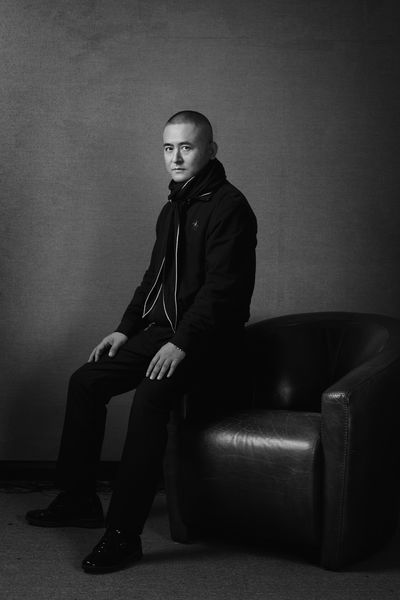Announcing Major Zeng Fanzhi Presentation Across Three Locations

Zeng Fanzhi, ‘Untitled’, 2018 © Zeng Fanzhi
Announcing Major Zeng Fanzhi Presentation Across Three Locations
12 June 2018
Artist
Hauser & Wirth is delighted to announce plans to present a comprehensive exhibition by renowned artist Zeng Fanzhi this Autumn across three of the gallery’s spaces in Zurich, London and Hong Kong.
The new form of presentation will reveal recent bodies of work, shown with important paintings. Iwan Wirth says, ‘This is the first time in the gallery’s history that we have mounted an exhibition of a single artist across three locations at once. In this way we will show the full scope of Zeng Fanzhi’s visionary approach to painting to a global audience.’
The unifying theme of these presentations is Zeng Fanzhi’s investigations into the possibilities of painting in the contemporary era which the artist continues to explore throughout his oeuvre. While united by this shared concept, each site demonstrates a diverse approach to subject matter: in Zurich the exhibition features new abstract landscapes; in London the focus is figuration; and in Hong Kong paintings and drawings deftly draw on Chinese and Western representation and gesture, reflecting Zeng Fanzhi’s research process and experimental approach.
The distinct genres are interwoven and influence one another to create a compelling context in which to view the works. The exhibition will allow viewers the opportunity to gain an unprecedented and in-depth understanding of the future development of Zeng Fanzhi’s contemporary practice. About the Artist Zeng Fanzhi was born in Wuhan, China in 1964 and graduated from the Hubei Institute of Fine Arts in Wuhan in 1993.
One of the most celebrated artists working today, Zeng is lauded across the globe for his mastery of painting and ability to conjure emotion from his subject matter. These interests informed his earliest series of paintings, Meat Series and Hospital Triptychs. Both bodies of work are characterised by an approach that is at once objective and tender. These early works between 1989 and 1994 set the stage for an intensely personal and expressive painting practice that documents a prolific period of social and economic development in Chinese history.

Zeng Fanzhi. Photo: Li Zhenhua
Working in the wake of rapid modernisation and urbanisation in China, Zeng began to paint city dwellers, always wearing masks so as to disguise human pain and agony behind a ‘socially acceptable’ face. Inspired by artists as diverse as Francis Bacon, Willem De Kooning and Max Beckmann, these works, known as the Mask series, straddle realism and imagination merged with a free and expressionistic style of painting.
Following a period of critical and commercial success, Zeng made the conscious decision to move away from formal figuration and rules guarding composition and representational painting, and entered into a new exploration of abstraction and expressive portraiture. In 1996 he embarked on a new series, removing the coverings from his subjects’ faces to reveal their raw emotion and the reality of their suffering.
Over the past two decades, Zeng has reacquainted himself with Classical Chinese painting, and art particularly from the Northern Wei to Song and Yuan Dynasties from the fourth to fifteenth centuries. Informed by these new interests, Zeng has moved further into abstraction, creating highly gestural landscapes that share the same dynamic energy of his portraiture. Over the past 10 years, Zeng has developed this series to investigate the complex tension between nature, wildlife, and humanity.
In parallel to his experimentations with ‘landscape’ painting, Zeng continued to forge ahead with a more experimental language in his portraiture studies: the We Series comprises paintings produced by a method that requires intense physical involvement: Zeng uses his entire body, stretching across the breadth of these large- scale canvases to apply color with multiple paintbrushes simultaneously.
Zeng Fanzhi has exhibited at a number of international museums. Recent solo exhibitions include: ‘Zeng Fanzhi Van Gogh’, The Van Gogh Museum, Amsterdam (2017); ‘Zeng Fanzhi: Parcours’, the Ullens Center for Contemporary Art, Beijing (2016); ‘Zeng Fanzhi’, Musée d’Art Moderne de la Ville de Paris, Paris (2013); ‘Zeng Fanzhi’, Punta della Dogana, Venice (2013); ‘Zeng Fanzhi: Being’, Hong Kong Convention and Exhibition Center, Hong Kong (2011); ‘2010 Zeng Fanzhi’, The Rockbund Art Museum, Shanghai (2010); ‘Zeng Fanzhi’, The National Gallery for Foreign Art, Sofia (2010); ‘Zeng Fanzhi’, Fundacion Francisco Godia, Barcelona (2009); ‘Zeng Fanzhi: Idealism’, Singapore Art Museum, Singapore (2007); ‘Zeng Fanzhi’, Musée d’ art modern de Saint-Étienne, France (2007); and ‘i/We: The Painting of Zeng Fanzhi 1991’2003’, Shanghai Art Museum, Shanghai (2003). Zeng’s works are in the collections of several prominent institutions, including the Musée d’Art Moderne de la Ville de Paris, Paris; Francisco Godia Foundation, Barcelona; Singapore Art Museum, Singapore; National Art Museum of China, Beijing; Shanghai Art Museum, Shanghai; M+ Museum, Hong Kong; Fukuoka Asian Art Museum, Fukuoka; Denver Art Museum, Denver CO; and San Francisco Museum of Modern Art, San Francisco.
Related News
1 / 5




